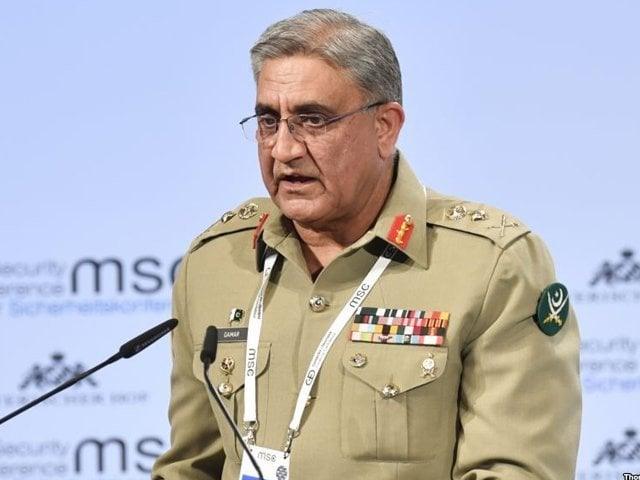Islamabad:
While discussing personal specific legislation, some members of a constitutional bench of the Supreme Court on Tuesday referred to a pointed right-wing decision-written by SC Senior Puisne judge Syed Mansoor Ali Shah-Om to give a six-month extension during a former army chief’s term of office.
The cabinet of former Prime Minister Imran Khan approved a three -year extension of the general Qamar Javed Bajwa in August 2019 considering “a worsening of national security situation in the region”.
On November 26, 2019, just days before the end of his tenure, the Supreme Court suspended the extension with reference to a number of irregularities. It ordered the PTI government and the army to present statutory provisions and detailed arguments about the rationale behind the move.
This suspension triggered a serious crisis, which led to a possible “clash of institutions”.
However, a bench led by the former Chief Justice asif Saeed Khosa and made up of justice Mian Mazhar Alam Khan Miaankhel and Justice Shah on November 28 the government 6 months to legislate and smooth the lacunas in the re -utilization or extension of an army chief.
This judgment paved the way for General Bajwa to stay on until a new law determined his Terms of Service.
Tuesday, during the hearing of the Intra-Court Appeals filed against a former SC order that canceled litigation from May 9, 2023 rebels in military courts, the discussion was guarded to various legislation and the judiciary’s role in their adoption .
The head of the seven-member bench, Justice Aminuddin Khan, noted that Salman Akram Raja, the lawyer of one of the 9 May penalties, had referred to India in his arguments.
“Raja declared that in India appeal against military litigation to an independent court. The question is whether the right to appeal in India was awarded through parliamentary law or judicial directives?” He asked.
Imran’s lawyer Uziir Bhandari replied that he was not aware of the details of this case.
Justice Muhammad Ali Mazhar noted that Parliament legislated to give the right to appeal to the Indian spy Kulbhushan Jadhav, who had also been awarded the death penalty by a military court.
“Before us is the example of Jadhav. He was granted the right of appeal through special legislation and the court of appeal was given because of the decision of the International Court of Justice, ”the judge noted.
Justice Naeem Akhtar Afghan noted that there is also a case regarding the expansion of a former army chief’s period of tenure. He said there was no law to extend the army’s tenure and parliament that was legislated for the extension of the Supreme Court’s instruction.
The head of the bench, Justice Aminuddin Khan, complained that “all people” put their heads together just to issue a review for the extension of an army manager. “This was our situation,” he noted.
Under the argument from former Prime Minister Imran Khan’s lawyer, the bench members also discussed the PTI founder’s recent letters written to various state officials.
Uzir Bhandari, while referring to the argument from the famous lawyer Aitzaz Ahsan in terms of manner in which litigation takes place in military courts, it is not even allowed in the event of trial performed in a prison. To take “a bunch of paper”.
The trials of PTI founder Imran Khan have in various cases been held inside Rawalpindis Adiala prison.
Justice Aminuddin Khan excepted the claim and asked how whole letters came out of the same prison. Justice Musarrat Hilali also agreed with Justice Khan, adding that letters written from prisons are being discussed these days.
Last month, Imran Khan wrote a letter to Chief Justice of Pakistan Yahya Afridi. This letter was followed by a series of three other open letters addressed to Army Chief General Syed Asim Munir.
The PTI founder’s lawyer claimed that Pakistan’s GSP+ status is in danger as the European Union (EU) does not see the military trial against civilians.
Justice Jamal Mandokhail noted that fundamental rights are a constitutional requirement and cannot be subject to any international benefit. Justice Hilali stated that fulfilling international obligations is the federal government’s responsibility, not the Supreme Court.
Bhandari claimed that a soldier’s oath states that an officer’s order is more important than life itself. Justice Hassan Rizvi questioned whether he suggested that the army can only intervene in wartime, but not in the event of an attack on “home”.
The lawyer claimed that this thinking must change so that the army can do everything. He questioned why Lahore Corps Commander House was not defended during the attack on 9 May 2023
Justice Musarrat Hilali noted he was saying one thing while his client, Imran, said something else. She talked about the lawyer and said, “Your client says he will only talk to those who are in power.” Bhandari refused to comment on “questions outside the courtroom”.
However, justice declared that it was not about politics, rather it was a reality.
Justice Aminuddin Khan asked if a member of the assembly had ever raised his vote against the Pakistan Army Act, 1952 in the Assembly. “Has any member ever introduced a private bill against the law?” Bhandari declared that the case was now in court.
The bench resumes the hearing of the case today.



